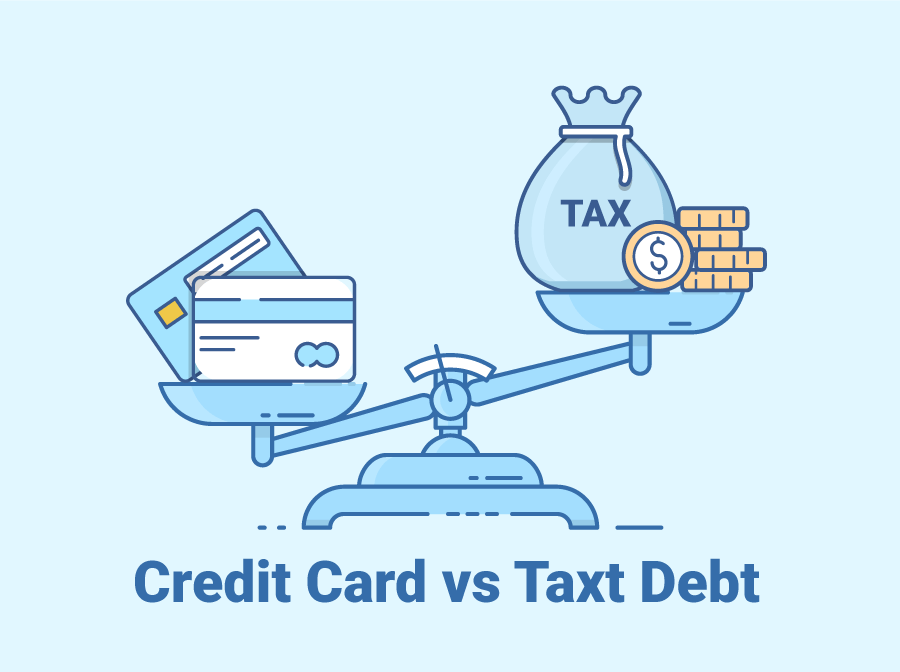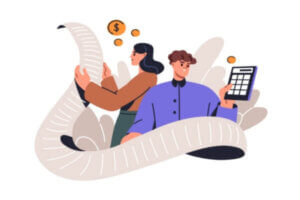The choice between paying credit card debt and taxes isn’t as simple as calculating money saved on interest. Failing to pay taxes has massive repercussions – just ask Martha Stewart.
Here’s the short answer: You don’t want to owe the IRS money.
IRS Penalties vs. Credit Card Interest
The average interest rate on a credit card is 15.32%. That sounds pretty good compared to the 5.57% you would pay on tax debt, but there are additional fees and penalties to weigh when you can’t pay your taxes.
Here is a breakdown of the penalties for not paying tax debt.
Interest – federal short-term rate plus 3%, which was 5.57% in February 2019.
Failure-to-pay penalty – late payment fee comes to 0.5% (up to a maximum of 25%) of the original debt each month until it is paid in full. For example, if you owe $5,000 in taxes. The late payment fee is $25/month with a maximum fee of $1,250. If you agree to a repayment plan, the fee is lowered to 0.25%. The fee increases to 1% if the IRS sends a notice of intent to levy property and your debt is still unpaid.
Failure-to-file penalty – not filing your taxes results in a fee of 5% (up to a maximum of 25%) for each month your return is late. Returns that are over 60 days late are subject to a minimum penalty – the lessor of $210 or the total amount of unpaid taxes.
Consequences of Not Paying Taxes
If the interest and penalties weren’t enough to scare you into paying your tax debt, the IRS has other tools in its belt. It can simply take the money right out of your hands.
You’ll have plenty of notice before it comes to this. The IRS is required to send a written letter with the deadline to pay your debts in full. The notice will also list the charges, including taxes, interest and penalties.
If you still cannot pay your debts, the IRS will send Final Notice of Intent to Levy, which results in these three actions:
- Garnishing wages: The IRS will take money out of your paycheck leaving only what is needed to pay basic living necessities.
- Seizing assets: The IRS can hold up your bank account, and after 21 days, send the funds to themselves. They can also seize your property and sell it to recoup their money.
- Taking future tax refunds: Future tax refunds will be used to satisfy previous tax debt.
Consequences of Not Paying Credit Cards
There are severe consequences for failing to pay credit cards too.
For starters, there are late fees, but there is also something called a penalty interest rate. If you are 30 days late on your payments, credit card companies are allowed to increase your interest rate. Penalty interest rates average between 27-29.99%.
After three consecutive missed payments, credit card companies will often sell your debt to collection agency. You’ll begin to receive a barrage of collection calls.
As the debt continues to go unpaid, the credit card companies or collection agencies will try to retrieve their money through the legal system. They can file a lawsuit, called a judgement, and if approved, your wages could be garnished or your bank accounts could be frozen.
That sounds a lot like what the IRS can do, but the IRS doesn’t need the court system to garnish wages or seize property. In addition, if you can’t pay your credit card debt, there is a way out – bankruptcy.
You might be able to discharge your credit card debt through Chapter 7 bankruptcy, but tax debt is nearly impossible to discharge.
Bottom Line:
What it comes down to is not about money saved, but rather the worst-case scenario. If you lose your job and are in dire straits, you’ll have more flexibility with credit card debt. Debt consolidation and debt settlement remain options. You can fight a judgement through the legal system, or declare bankruptcy and start over. Tax debt never goes away, and the penalties and consequences are swift and severe.
Contact a nonprofit credit counseling agency, like InCharge Debt Solutions if you need help deciding what action to take.

3 MINUTE READ
Home » InCharge Blog »
Sources:
- Value Penguin (2019, August) Average Credit Card Interest Rates (APR) – August, 2019. Retrieved from https://www.valuepenguin.com/average-credit-card-interest-rates
- IRS (2019, August 1) Topic No. 653 IRS Notices and Bills, Penalties, and Interest Charges. Retrieved from https://www.irs.gov/taxtopics/tc653
- IRS (2019, June 21) Information About Wage Levies. Retrieved from https://www.irs.gov/businesses/small-businesses-self-employed/information-about-wage-levies

















